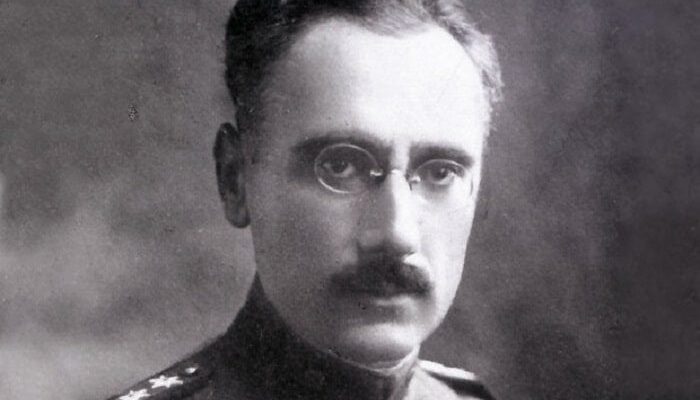
Mordechai Frizis (Μαρδοχαίος Φριζής), who fought in the Crimea and in the doomed Asia Minor campaign as well as the two World Wars, was the first senior officer in the Greek Army to fall on the battlefield during the Greek-Italian War.
Frizis was born into a Romaniote-Jewish family from Chalcis on New Year’s Eve in 1893. His parents, Jacob and Iopi, had a large family of twelve children.
His dream as a pupil was to become a military officer, despite his father’s objections, who preferred that he take up the family business. Frizis accordingly took exams at Greece’s Military Academy (Evelpidon School) but failed.
Nevertheless, he was able to enroll in Athens University Law School to the great satisfaction of his father who would at least be able to boast of his son becoming a lawyer.
However, young Frizis never abandoned his dreams of becoming an army man, and he volunteered for the Greek Army in 1916 during World War I. After his enlistment, he attended Officers Training school and graduated with the rank of Sergeant.
A great lieutenant
The Greek-Jewish officer fought on the Macedonian front and distinguished himself on the battlefield, resulting in a promotion to the rank of Lieutenant Colonel.
In January of 1919 he joined the expeditionary force fighting against the Bolsheviks in Ukraine during the Russian Civil War (The Crimean Expedition). His unit was commanded by Colonel Nikolaos Plastiras, who later became prime minister of Greece three times.
In August of 1919, Frizis’ unit moved to Smyrna and took an active part in the difficult and tumultuous Asia Minor Campaign. Lieutenant Colonel Frizis ended up being taken prisoner by the Turks in August of 1922.
The Turks offered to release Frizis immediately because he was not a Christian, but the brave Jew from Chalcis refused to leave his comrades, remaining in captivity until August of 1923, when he was released after the prisoner exchange agreement between Greece and Turkey.
Upon his return to Greece, Frizis was promoted to Captain and sent to Paris, where he attended the Ecole Militaire. After graduating from this military academy, he returned to Greece, and upon his completion of studies in the Hellenic School of War, he was promoted to the rank of Major.
Frizis was then transferred to his hometown to serve as an instructor at the Infantry School there.

By the end of the 1930s, he had been promoted to the rank of Colonel and in the spring of 1940, he was stationed at the headquarters of the VIII Division in Ioannina. As soon as the Greek-Italian war broke out in the early hours of October 28, 1940, he began serving as a detachment commander of the Delvinaki section of Greece’s VIII Division.
Facing Italy’s Julia Division and with his men behind him, Frizis fought the enemy fearlessly, stopping the Italian advance on the bridge of the Thyamis River, following with a counterattack.
It is he who captured the first Italian captives of the war (a total of fifteen officers and seven hundred soldiers) and inflicted a major blow against the famous Julia Alpinist Division.
During the Greek army’s counter-offensive on Albanian territory as commander of an independent division, he overthrew sections of the Italy’s Modena Division and opened the way for the occupation of Prometheus on December 4, 1940.
When the Italians countered with aerial bombing a day later, his men took cover in trenches, while he continued riding his horse over the battlefield while shouting “Courage!” to rally his men.
Despite being severely wounded in the stomach, Col. Frizis continued trying to rally his men. After the Italian aircraft finally withdrew and the smoke had cleared, the fearless military leader, a veteran of so many campaigns, was discovered dead on the battlefield.
The legacy of Colonel Frizis
An Orthodox priest prayed over Col. Frizis’ body in the absence of a rabbi.
The Colonel’s remains were finally located in 2002, and on October 23rd of that year, they were transferred to Thessaloniki, where they were reburied in the New Jewish Cemetery of Thessaloniki.
Colonel Frizis has been honored with many medals, both in life and after death. Busts of the famous Jewish military hero stand outside the War Museum in Kalpaki, at his birthplace of Chalcis and at the Athens War Museum. Several streets in Athens and Thessaloniki have been named after him as well.
Mordechai Frizis was only one of the 12,898 Greek Jews who served in the armed forces during the 1940 to 1941 Greco-Italian War. In all, their casualties amounted to 513 dead and 3,743 injured.
His brave and selfless sacrifice exemplifies the many contributions of Greek Jews to their homeland, which will be remembered forever.



